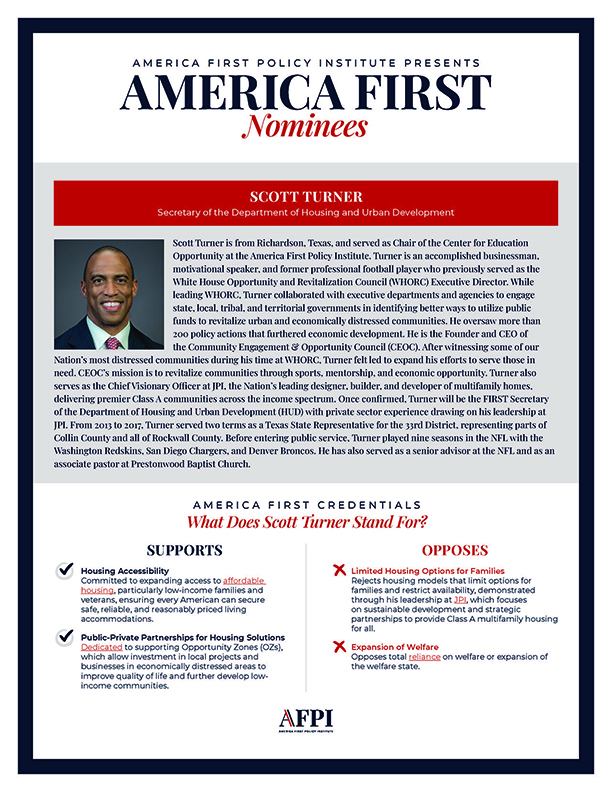America First Nomination: Scott Turner
Biography
Scott Turner is from Richardson, Texas, and served as Chair of the Center for Education Opportunity at the America First Policy Institute. Turner is an accomplished businessman, motivational speaker, and former professional football player who previously served as the White House Opportunity and Revitalization Council (WHORC) Executive Director. While leading WHORC, Turner collaborated with executive departments and agencies to engage state, local, tribal, and territorial governments in identifying better ways to utilize public funds to revitalize urban and economically distressed communities. He oversaw more than 200 policy actions that furthered economic development.
He is the Founder and CEO of the Community Engagement & Opportunity Council (CEOC). After witnessing some of our Nation’s most distressed communities during his time at WHORC, Turner felt led to expand his efforts to serve those in need. CEOC’s mission is to revitalize communities through sports, mentorship, and economic opportunity.
Turner also serves as the Chief Visionary Officer at JPI, the Nation’s leading designer, builder, and developer of multifamily homes, delivering premier Class A communities across the income spectrum. Once confirmed, Turner will be the FIRST Secretary of the Department of Housing and Urban Development (HUD) with private sector experience drawing on his leadership at JPI.
From 2013 to 2017, Turner served two terms as a Texas State Representative for the 33rd District, representing parts of Collin County and all of Rockwall County. Before entering public service, Turner played nine seasons in the NFL with the Washington Redskins, San Diego Chargers, and Denver Broncos. He has also served as a senior advisor at the NFL and as an associate pastor at Prestonwood Baptist Church. Turner attended the University of Illinois, where he was a starting cornerback and earned a Bachelor of Arts in speech communication. In 2016, he received an honorary Doctor of Humanities from Dallas Baptist University for his outstanding Christian leadership.
Outside of work, Turner and his wife, Robin, are active in their church and community. They are proud supporters of their son, Solomon, a recent graduate of the University of Illinois.
America First Credentials
Supports
Housing Accessibility
Committed to expanding access to affordable housing, particularly low-income families and veterans, ensuring every American can secure safe, reliable, and reasonably priced living accommodations.
Public-Private Partnerships for Housing Solutions
Dedicated to supporting Opportunity Zones (OZs), which allow investment in local projects and businesses in economically distressed areas to improve quality of life and further develop low-income communities.
Safe Affordable Housing
Supports investments in OZs, which enable the creation of safe and affordable housing options for the most underserved communities in rural and urban areas. To date, house values in OZs have increased by 3.4% with no observable increase in rent. Plus, housing unit growth has accelerated in OZs relative to communities with similar characteristics—low-income, impoverished, and racially diverse—that were not designated as OZs.
Promoting Community Revitalization and Upgrading Infrastructure
- Turner’s leadership will focus on revitalizing urban areas by prioritizing infrastructure upgrades, creating job opportunities, and enhancing access to quality education in underserved communities.
- OZs revitalize economically struggling neighborhoods by attracting public and private investments. These zones often focus on improving infrastructure, building commercial spaces, and upgrading residential areas, all of which contribute to HUD’s goal of fostering communities.
- HUD supports such revitalization efforts as a way to reduce poverty, improve quality of life, and attract further investments in distressed urban and rural areas.
- OZs account for 20% of all market-rate apartment units being developed nationally compared to only 8% in those areas before the Tax Cuts and Jobs Act of 2017 passed, which created OZs.
Long-term Funding for Historically Black Colleges and Universities (HBCUs)
- Supports President-elect Trump’s historic funding of HBCUs. This funding helped ensure their sustainability by securing long-term, stable funding, which allowed them to continue providing quality education and support to underserved students in the face of historical underinvestment.
- Federal investment in HBCUs is a critical component for housing redevelopment and community investment through many HUD programs, such as the Community Outreach Partnership Centers, which grant funding to colleges and universities nationwide.
Small Business Deregulation
- Supports deregulation and low taxes to boost small businesses through the Office of Small & Disadvantaged Business Utilization and create local, sustainable jobs. This bolsters one of HUD’s priorities, which is to encourage local job creation through the Jobs Plus Initiative program.
- OZs have raised employment growth by 3 to 4.5 percentage points relative to similar communities not designated as OZs.
Opposes
Limited Housing Options for Families
Rejects housing models that limit options for families and restrict availability, demonstrated through his leadership at JPI, which focuses on sustainable development and strategic partnerships to provide Class A multifamily housing for all.
Expansion of Welfare
Opposes total reliance on welfare or expansion of the welfare state.
America First Achievements
While serving as WHORC Executive Director, Scott Turner created historic public-private partnerships leading to huge growth in the most underserved communities.
Fostering Economic Opportunity
Supported the Tax Cuts and Jobs Act of 2017, which lowered corporate and individual tax rates and stimulated economic growth and job creation, in part due to the creation of OZs.
Bipartisan Partnerships
OZ investments are now in more than 8,700 communities and have bipartisan support at the federal and state levels.
Billions in Private Investment
OZs have attracted $84 billion in investments that have resulted in infrastructure and housing revitalization.
